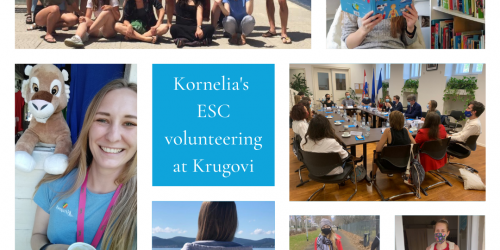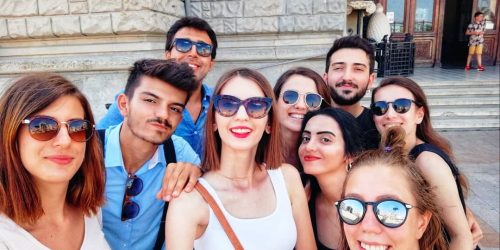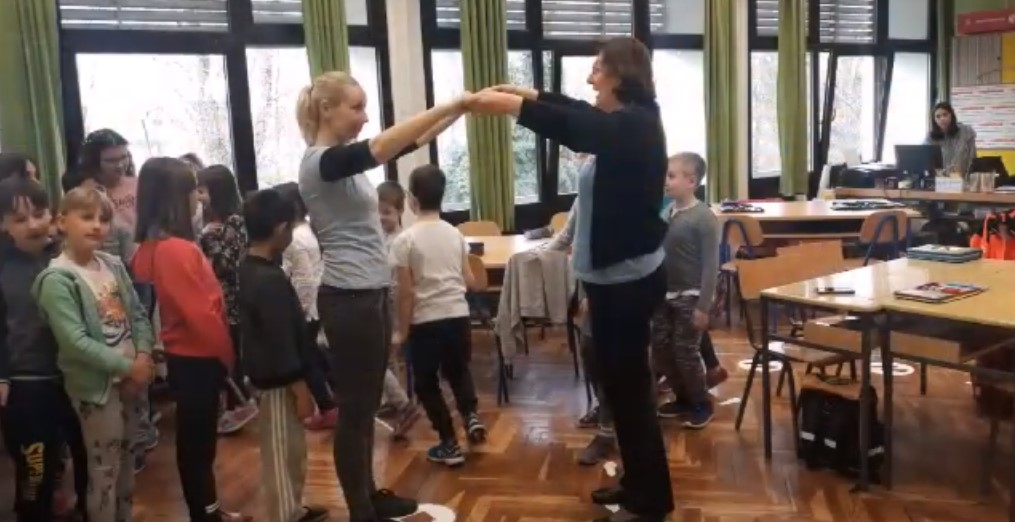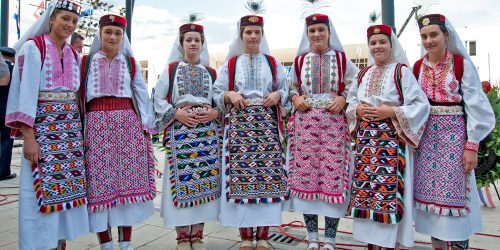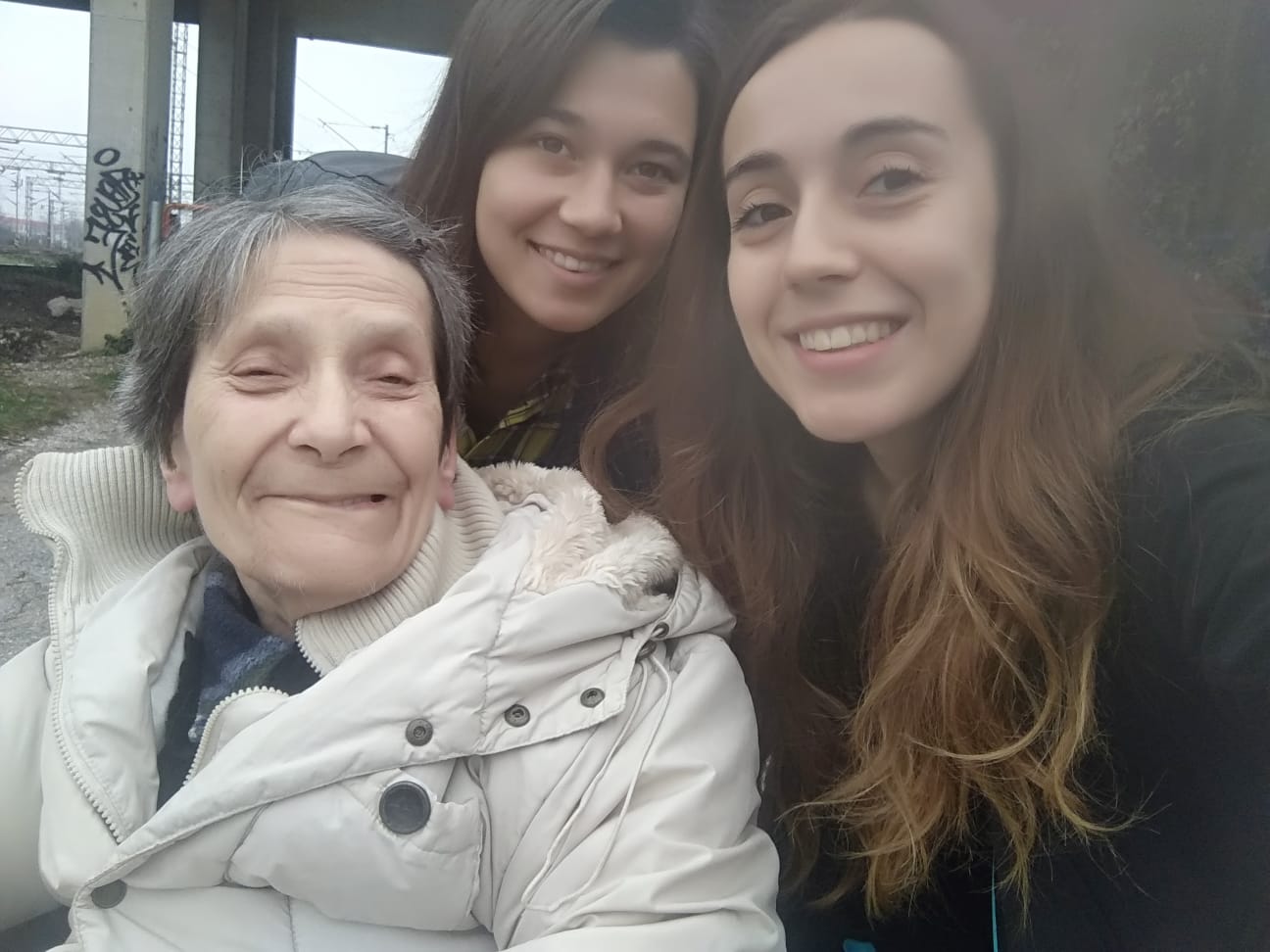Mentoring cicle
Since my experience with EVS started in 2015, I had the chance to learn so many things about it. And I also was able to travel and learn even more things. In 2018 I went to a training course with people that were so experienced on this subject. Some of them with 20 years of work on the EVS program. On that training we were able to create some tools to help the EVS process. My team was responsible to create something that helped mentors and volunteers understand the mentors’ role.
Now I am going to share with you more or less what we decided that the mentoring cycle should be. Of course, this is not an official tool. Is just the opinion of people that are used to work with these projects and think this should be the best way of doing things.
This cycle has the following 8 steps:
1. TRAINING BY THE HOST ORGANIZATION AND CLARIFICATION OF THE MENTORS’ ROLE
Every host organization should organize a detailed training for mentors. The main target of the training should be the preparation of the mentors through the clear understanding of their role, and the explicit defining of their work’s boundaries.
The mentors may discuss and clarify every doubt with the hosting organization, so that their tasks and responsibilities are clear and obvious. This leads to ideal preconditions for a successful carrying out of their work
2. HELPING WITH THE ARRIVAL OF THE VOLUNTEERS
The arrival of the volunteers is a very important moment. It is vital for the mentors to present themselves in a very positive and friendly way and make a nice first impression.
Despite the possible character and background differences that might cause communication problems, it is up to the mentors to try and overcome these and make the volunteers feel comfortable and relaxed.
The mentors should explain in detail to the volunteers each parts role and responsibilities, and also how they are going to work. For this purpose, sincerity and clarity would decrease any possible misunderstanding and can be the basis for a constructive cooperation between the two pares.
3. IMMERSION INTO THE NEW CULTURE AND THE COMMUNITY
It is essential for the volunteers to integrate, as fast as possible, into the local community and get familiar with the cultural environment of the host country. The mentors should work in this direction and ensure that the newly-arrived volunteers are given all the possible tools to achieve that
The mentors may:
- Help the volunteers find opportunities to meet other young people, to get socialized and to participate in leisure activities.
- Encourage the volunteers to travel around and visit interesting cities and landmarks (i.e. museums, archeological sites, etc.).
- Provide information about interesting events and festivals taking place in the city and countrywide, with a particular emphasis on those that exhibit traditional dances, music, and cuisine. In this way the volunteers can get a taste of the culture’s traditions.
- Facilitate the volunteers’ search for language courses and attendance of intensive classes.
- Help the volunteers become acquainted with the religious history, background and customs of the host country.
If the volunteers experience any obstacles or drawbacks during the process of becoming an active member of the host community, the mentors can remind them that it is not necessary to take everything too seriously or personally and urge them to enjoy the experience as much as possible. Humor helps a lot!
4. GETTING FAMILIAR WITH THE UNWRITTEN ‘CULTURAL RULES’
Living in a foreign country, a volunteer may face some difficulties in the encounter with the local culture. Different geographical, socio political and economic aspects define each country and make it unique.
It would be a good idea if the mentors suggested to the volunteers to approach any such instances with an open mind, always treating them as new opportunities for learning. For example, in some places more than others, it is socially acceptable to be late, to eat at different times during the day, to greet or communicate with others in a ‘local,’ behavioral code. Moreover, while in some countries it is preferred to be punctual, hardworking and reserved, in other countries it might be equally important to be relaxed, flexible and outgoing. The mentors should focus on inspiring to the volunteers the willingness to be receptive and feel more culturally oriented.
5. GUIDING THE VOLUNTEERS IN THEIR PROFESSIONAL DEVELOPMENT PROCESS
In each volunteering project there is a valuable learning component. Mentors can play an important part, if they have the skills for this phase. They can guide and support the volunteers to express their own personality and interests, drawing from their own creativity and background.
Furthermore, they can identify what kind of skills and competence they would like to develop during the project, relathing the volunteers to their future development plans, both on personal and professional levels.
In case the mentors realise that the volunteers are experiencing uncertainty in developing specific skills or abilities, they can point out possible opportunities, resources or ideas that would help them acquire these. Through the interaction between mentors and volunteers, the former can identify the latter’s certain interests and needs for their professional development. After that, they can refer these to the project coordinator or manager, as a feedback on the learning process of the volunteers. Thus, this maximizes the volunteers’ possibilities to find what they are looking for.
6. ACKNOWLEDGE OF THE LEARNING ACHIEVEMENTS
The Youthpass process is an integral part of the volunteering experience as a recognition of the learning process. Therefore, the volunteers should be encouraged to practice an ongoing self-reflection and evaluation of the learning outcomes during the volunteering activity.
The mentors may go through the eight key competence, as this is laid out by Youthpass, with the volunteers and help them become more aware of their learning achievements. In addition, the mentors could also suggest some particular steps that would contribute towards a more complete appreciation of the volunteering experience, such as keeping a diary, making drawings, or wring stories.
7. REDEFINING THE MENTORS’ ROLE, RESETTING LIMITS AND GRADUALLY ‘STEPPING BACK’
Mentoring is a one to one process. It is not possible to say when a mentor should “step back”. It depends on the volunteers’ dedication and ability (or on the lack of these) to work by themselves and deal with the issues that might arise. When it is evident that the volunteers are settled down and ready to confront any potential challenges, the mentors may at that point recess to the background and let the volunteers work and develop more independently but meeting regularly.
8. TOWARDS THE END: REFLECTING ON THE EXPERIENCE
The mentors must make sure the volunteers have all the tools to be able to fill Youthpass and help them:
- Utilize the sources of self-reflection and self-evaluation that they have worked on.
- Establish the future objectives and plan the next steps.
- Come up with some ideas on how they could apply and take advantage of the newly-acquired skills and knowledge, when they return home and restart their new projects or jobs
Finally, some mentors choose to keep in touch after the farewell, as this is an on-going and never-ending process of development for both parts.
I hope this can help you understand a little bit more about the mentor’s role.





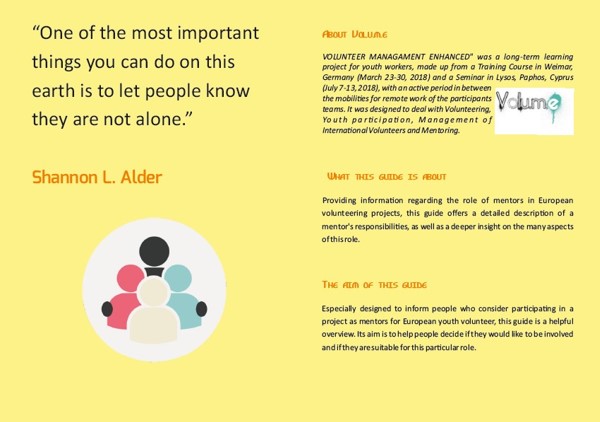
Helena

